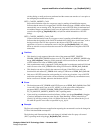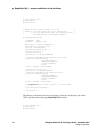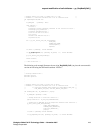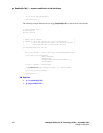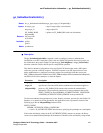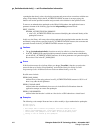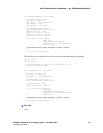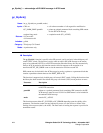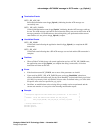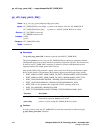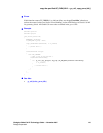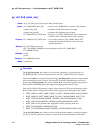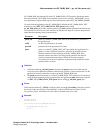Dialogic
®
Global Call IP Technology Guide — November 2007 425
Dialogic Corporation
acknowledge a SIP 200OK message in 3PCC mode — gc_SipAck( )
Termination Events
GCEV_SIP_ACK_OK
Successful termination event for gc_SipAck( ) indicating that the ACK message was
successfully sent
GCEV_ SIP_ACK_FAILED
Unsuccessful termination event for gc_SipAck( ) indicating that the ACK message could not
be sent. The ACK message could not be sent because the dialog state was invalid for the ACK
message generation. No modifications to the existing dialog was performed and the current
state remains as it was prior to the gc_SipAck( ) request.
Unsolicited Events
GCEV_SIP_200OK
Unsolicited event indicating the application should call gc_SipAck( ) to complete the SIP
transaction.
GCEV_SIP_ACK
Unsolicited event indicating that a SIP ACK message was received and the SIP transaction is
complete.
Cautions
• When a Global Call third-party call control application receives a GCEV_SIP_200OK event,
the application must call gc_SipAck( ) to complete the dialog’s transaction, or else that
transaction will time out and fail.
Errors
• If the function returns GC_ERROR, one or more of the parameters are invalid.
• Upon receiving GCEV_SIP_ACK_FAILED event, use the gc_ResultInfo( ) function to
retrieve information about the event. See the “Error Handling” section in the Dialogic
®
Global
Call API Programming Guide. All Global Call error codes are defined in the gcerr.h file while
IP-specific error codes are specified in gcip_defs.h.
• On failure, no modifications to the existing dialog or media session are performed and the
current state remains as it was prior to the incoming modification request.
Example
/* */
/* Description: Application event handler that processes new GC 3PCC events. */
/* */
/* Assumes: caller has enabled event handler for GCEV_SIP_ACK, */
/* GCEV_SIP_ACK_FAILED, GCEV_SIP_ACK_OK, and GCEV_SIP_200OK */
/* */
/* Dialogic Header Files */
#include <gcip.h>
#include <gclib.h>



